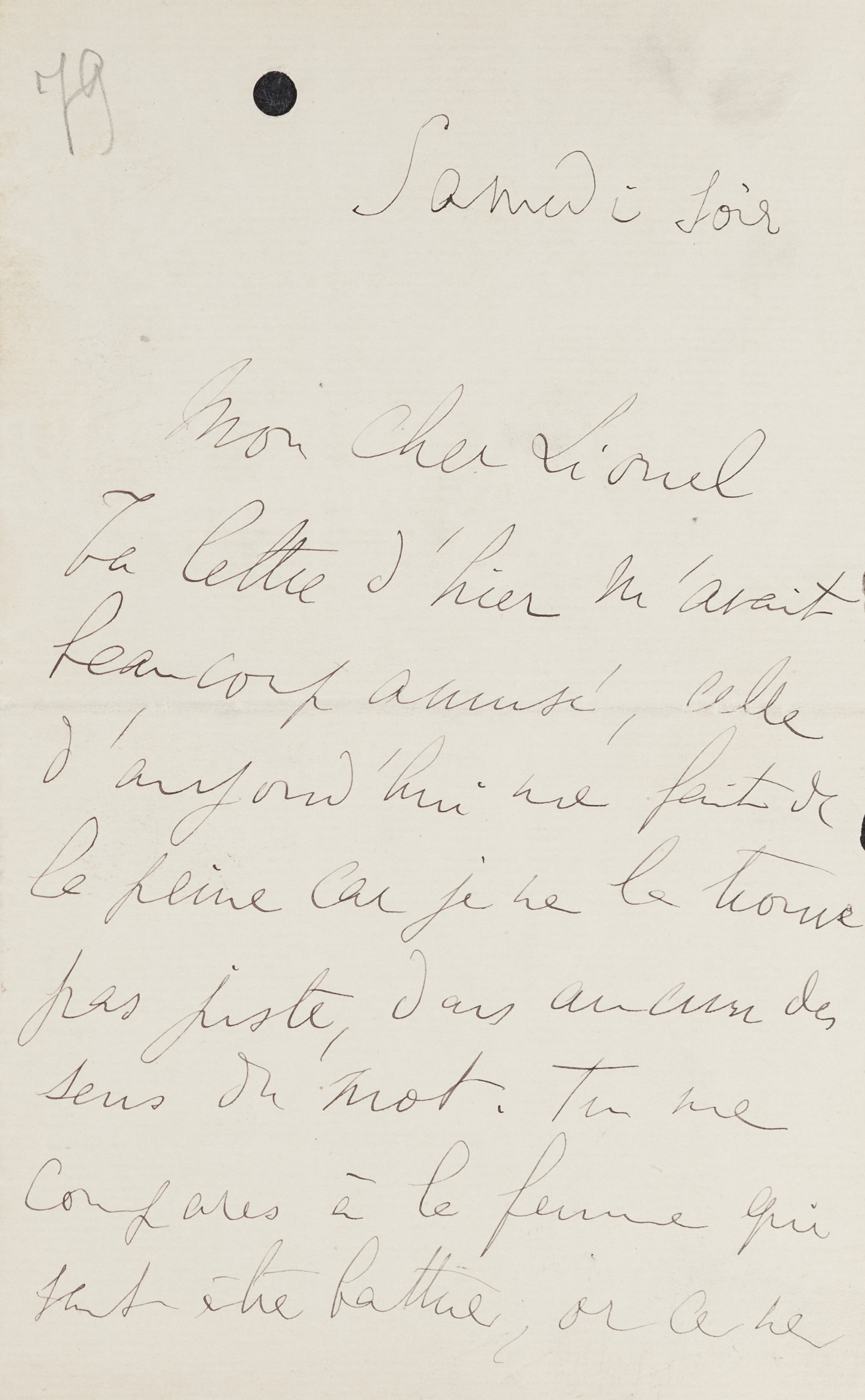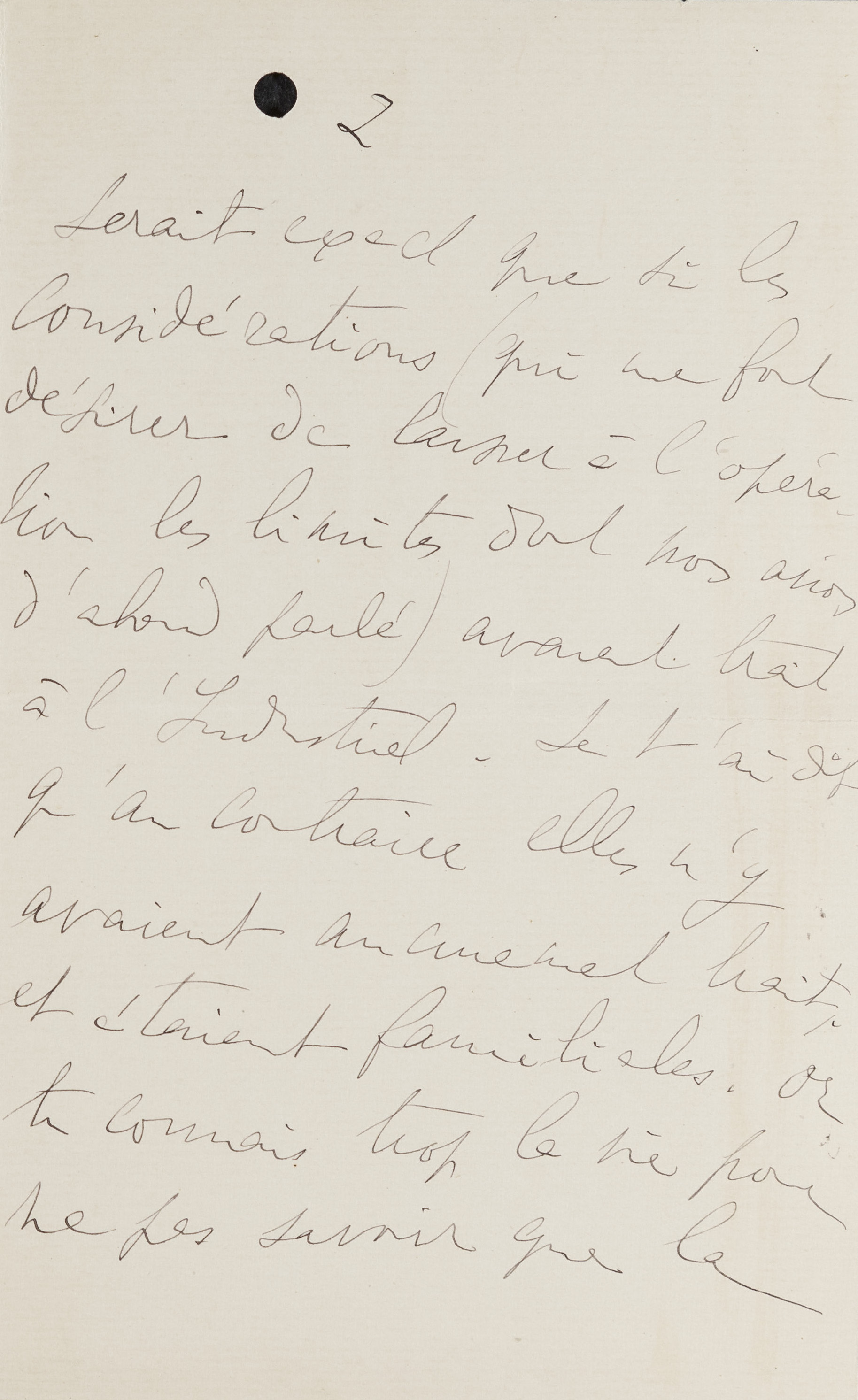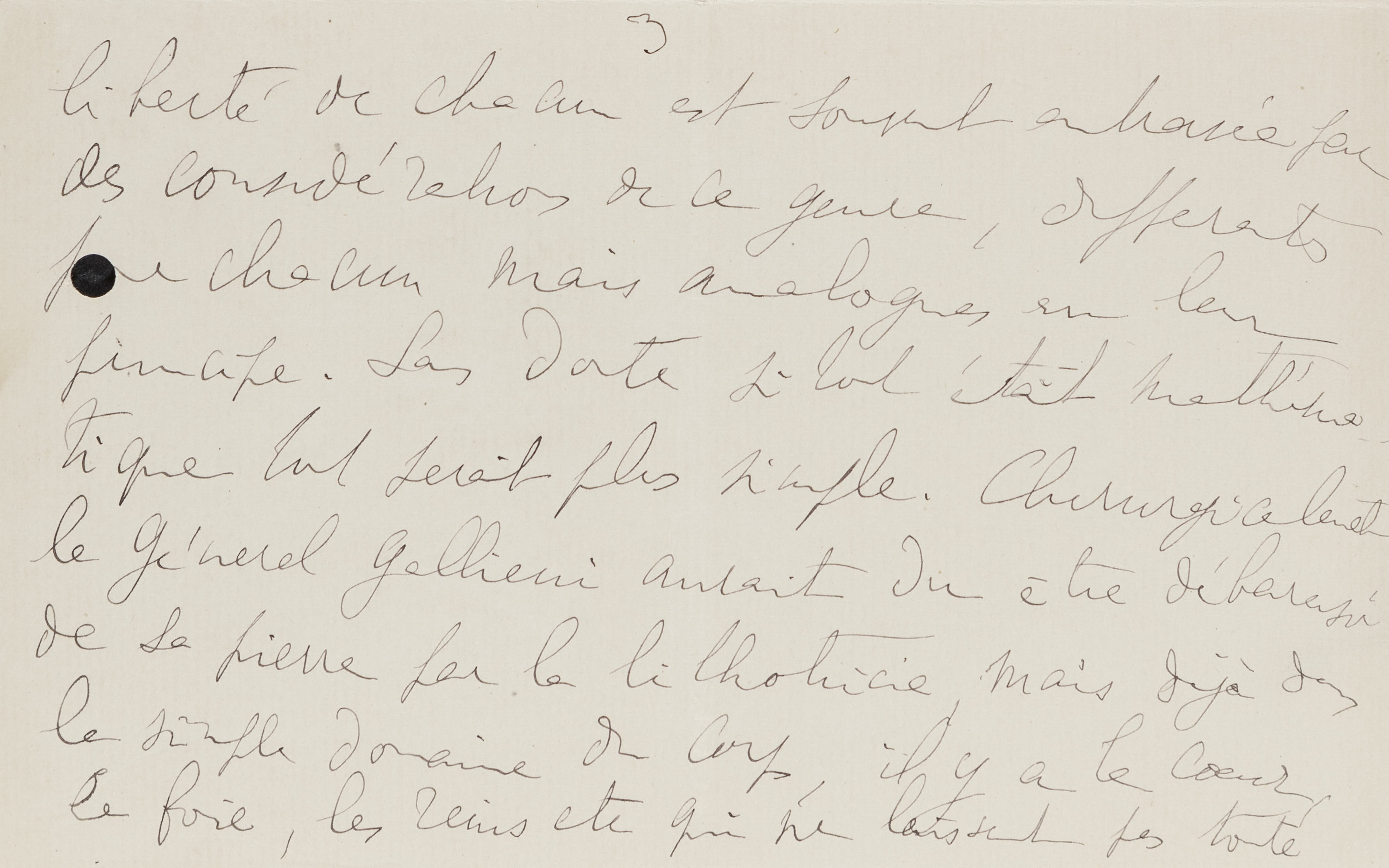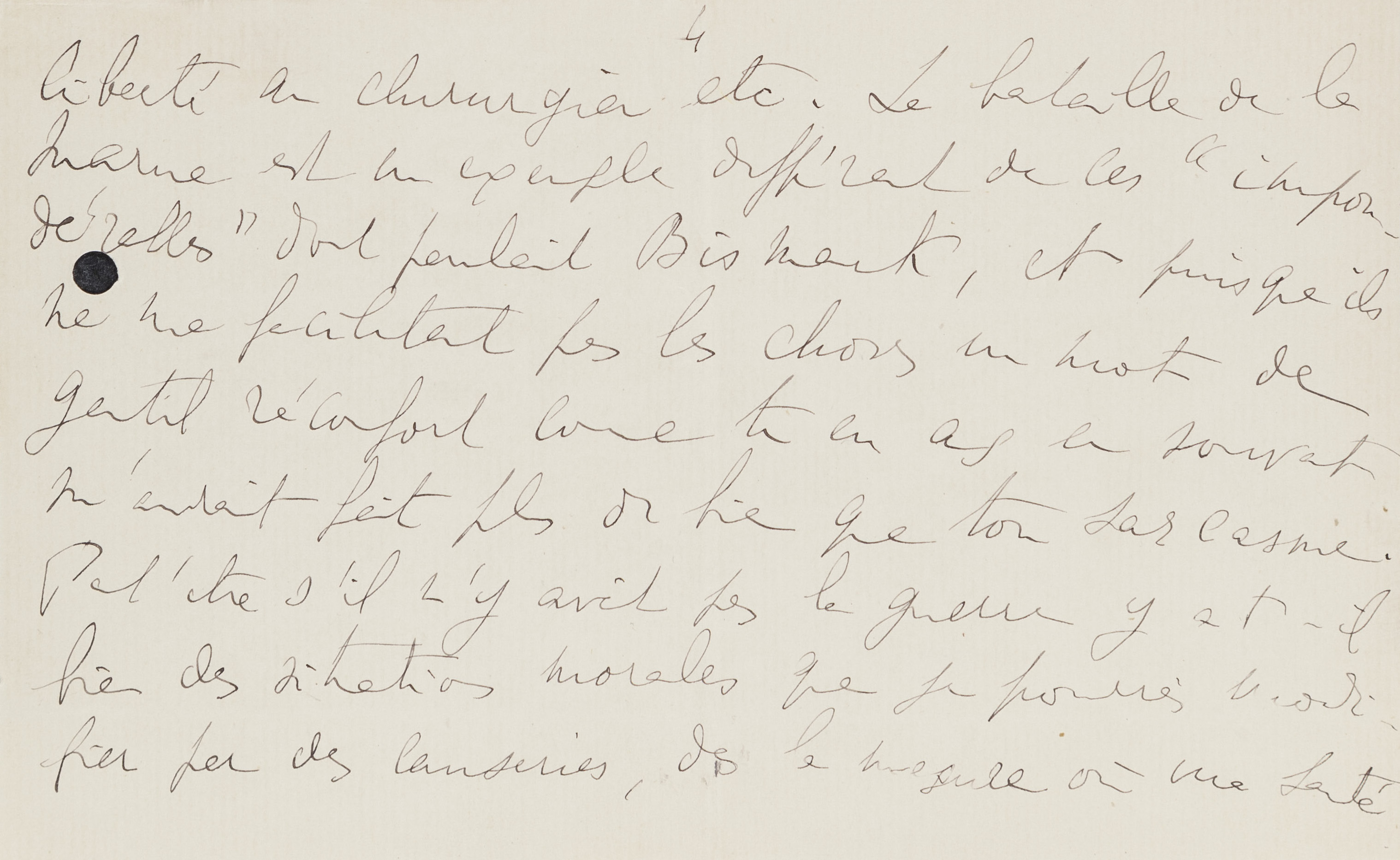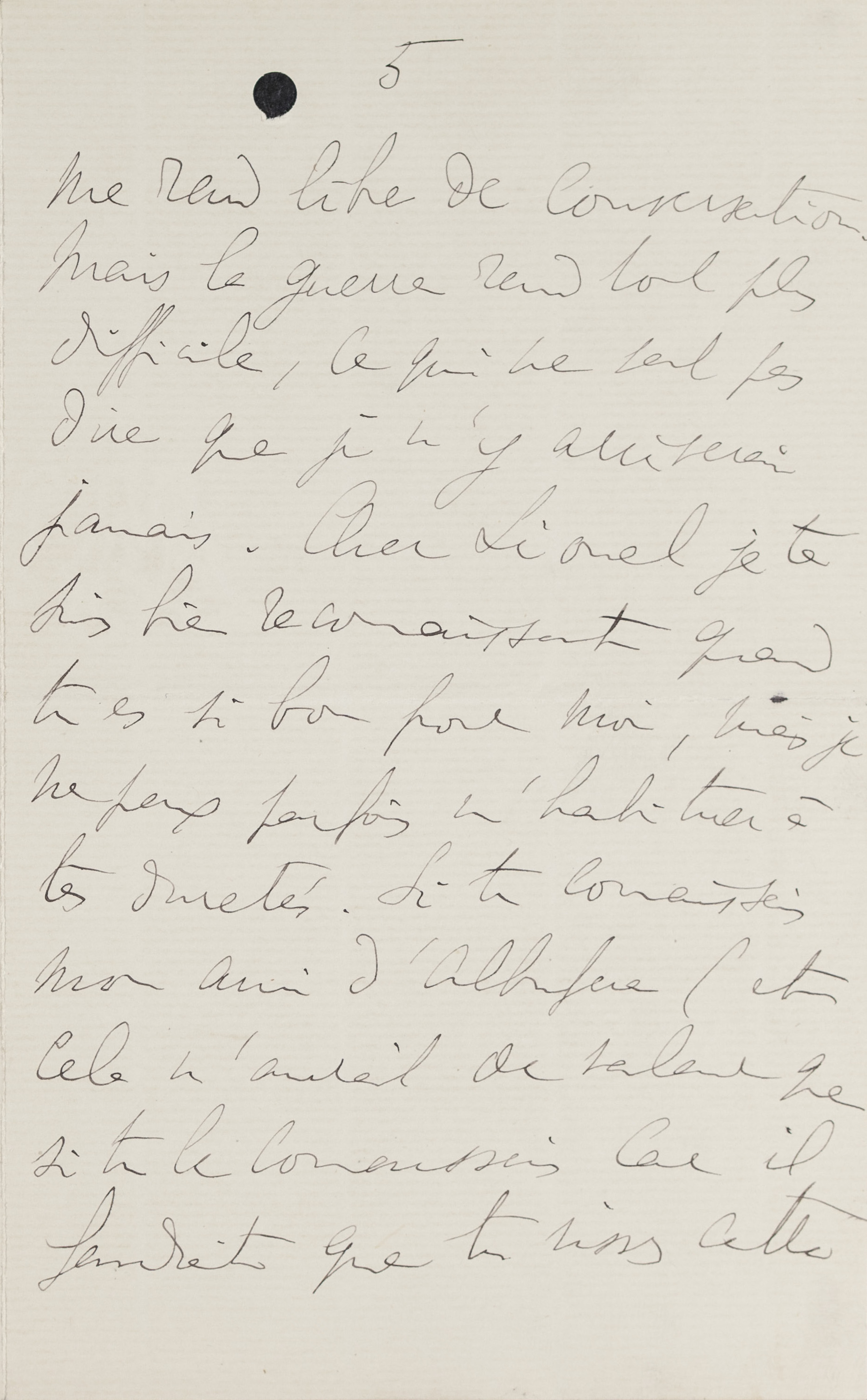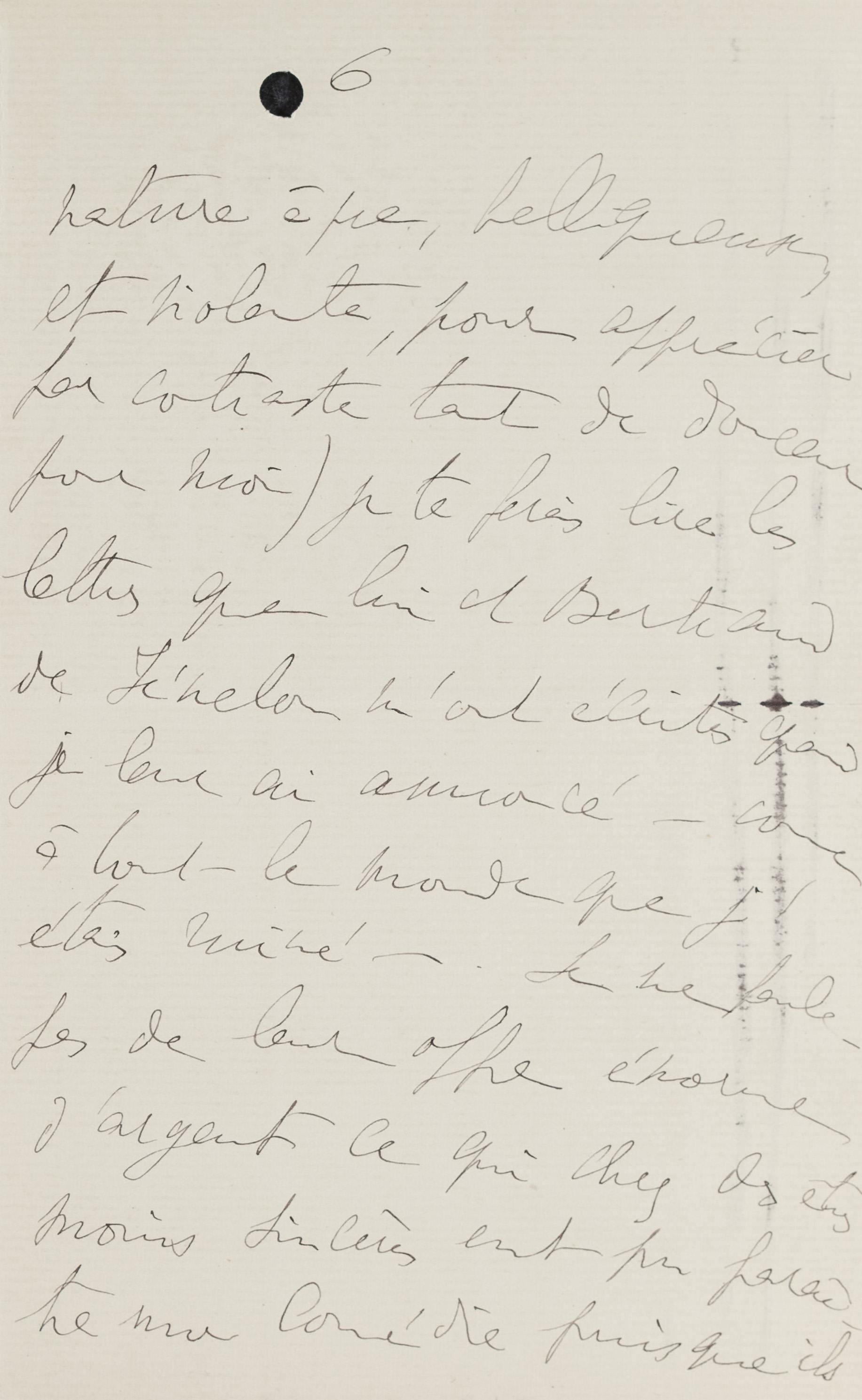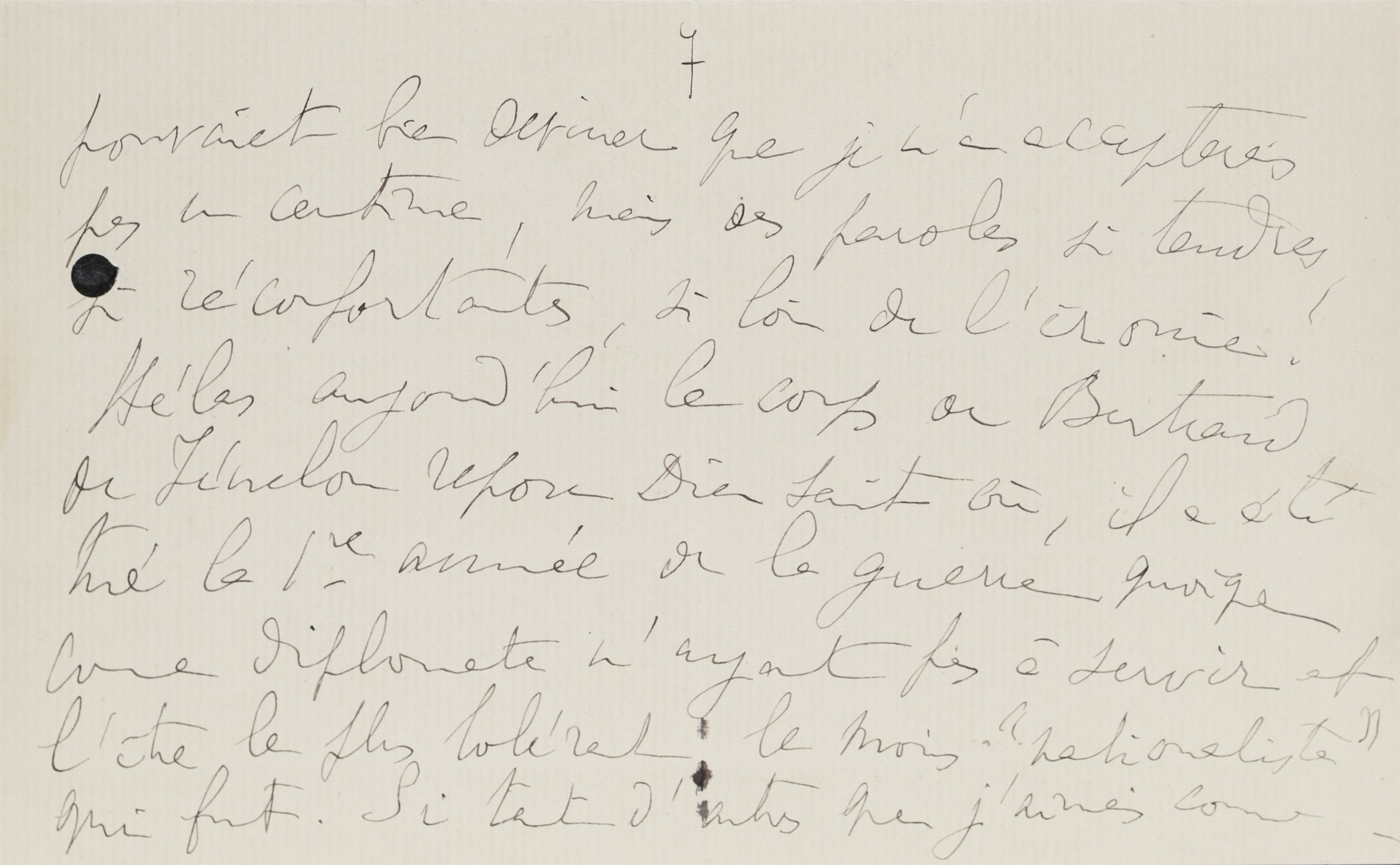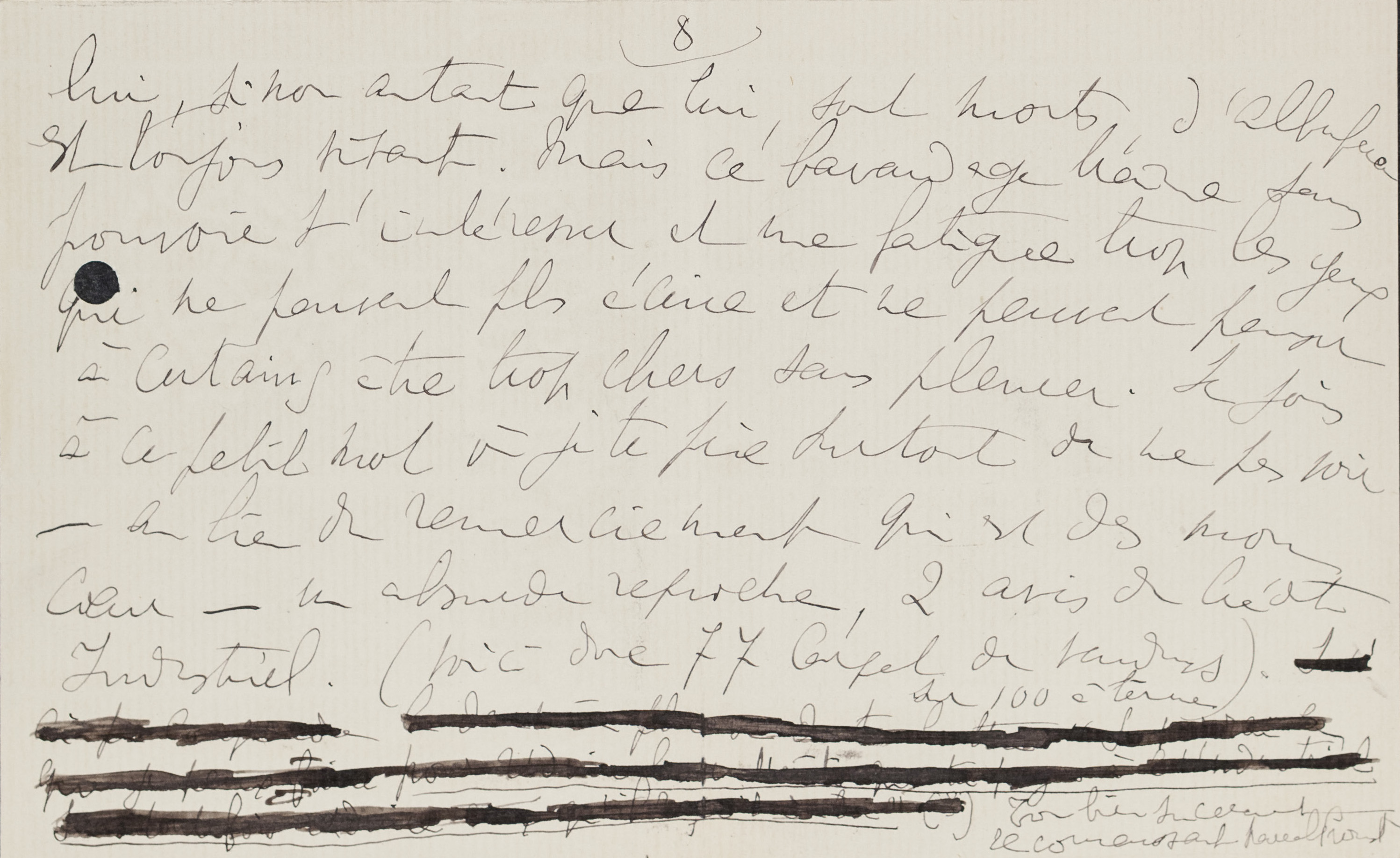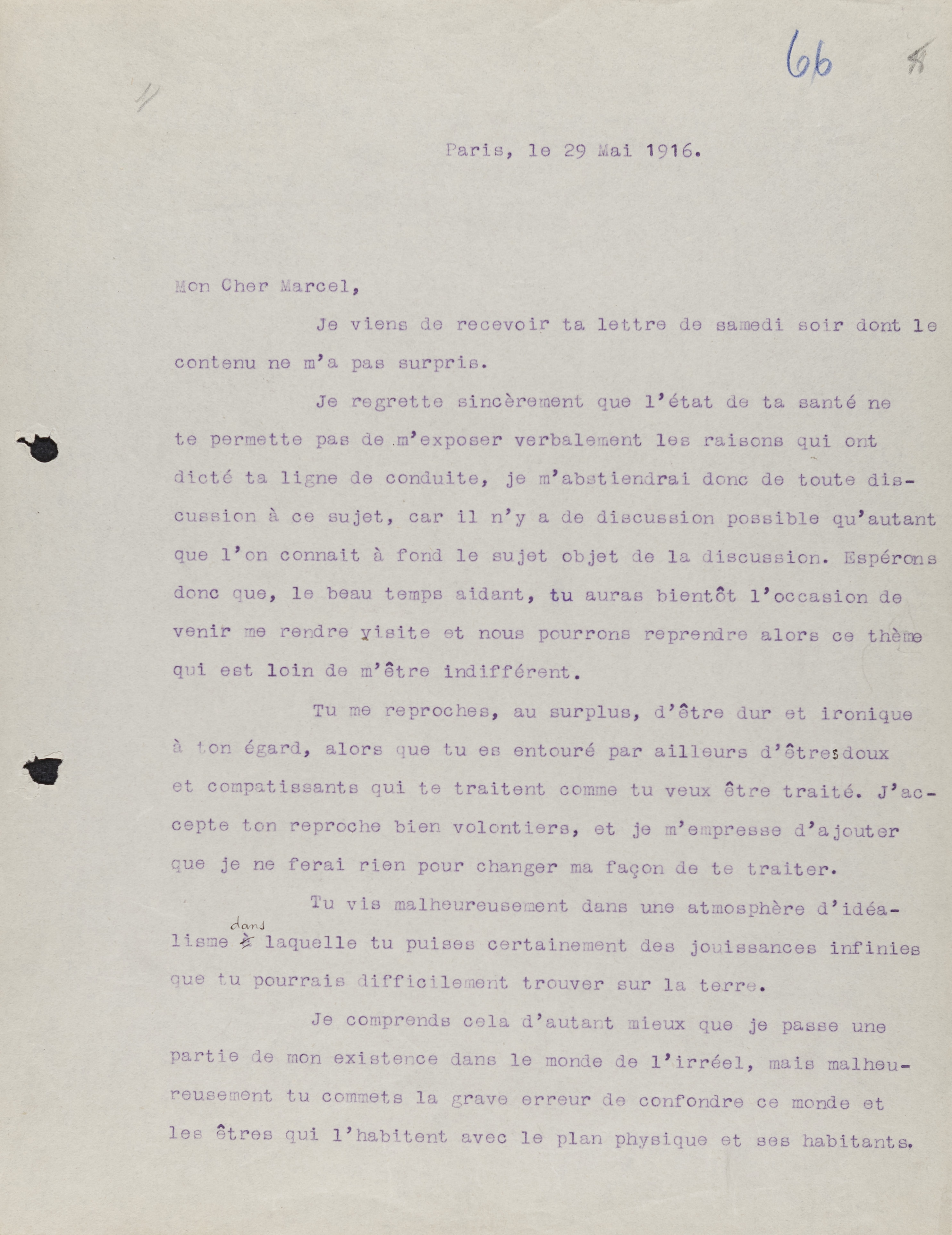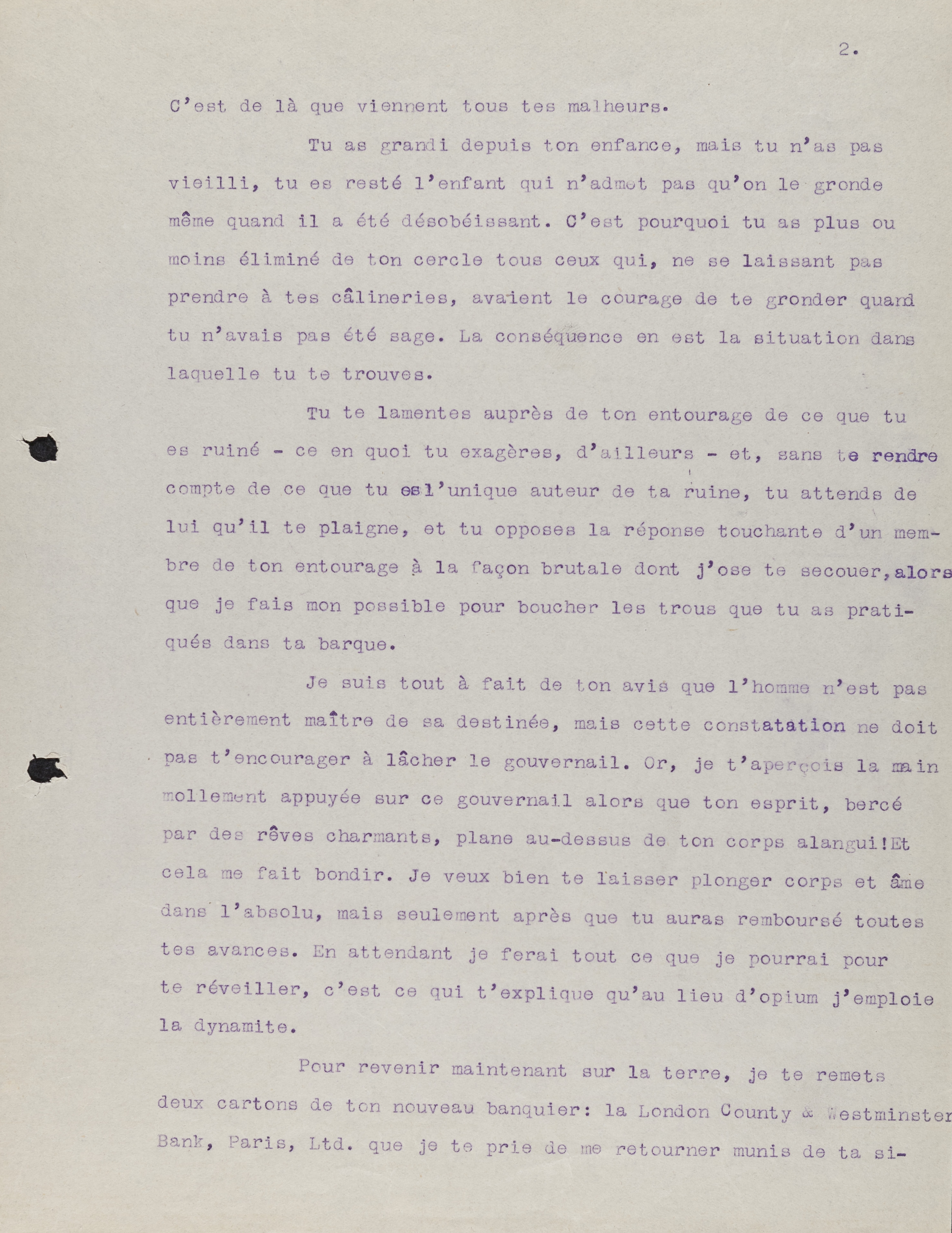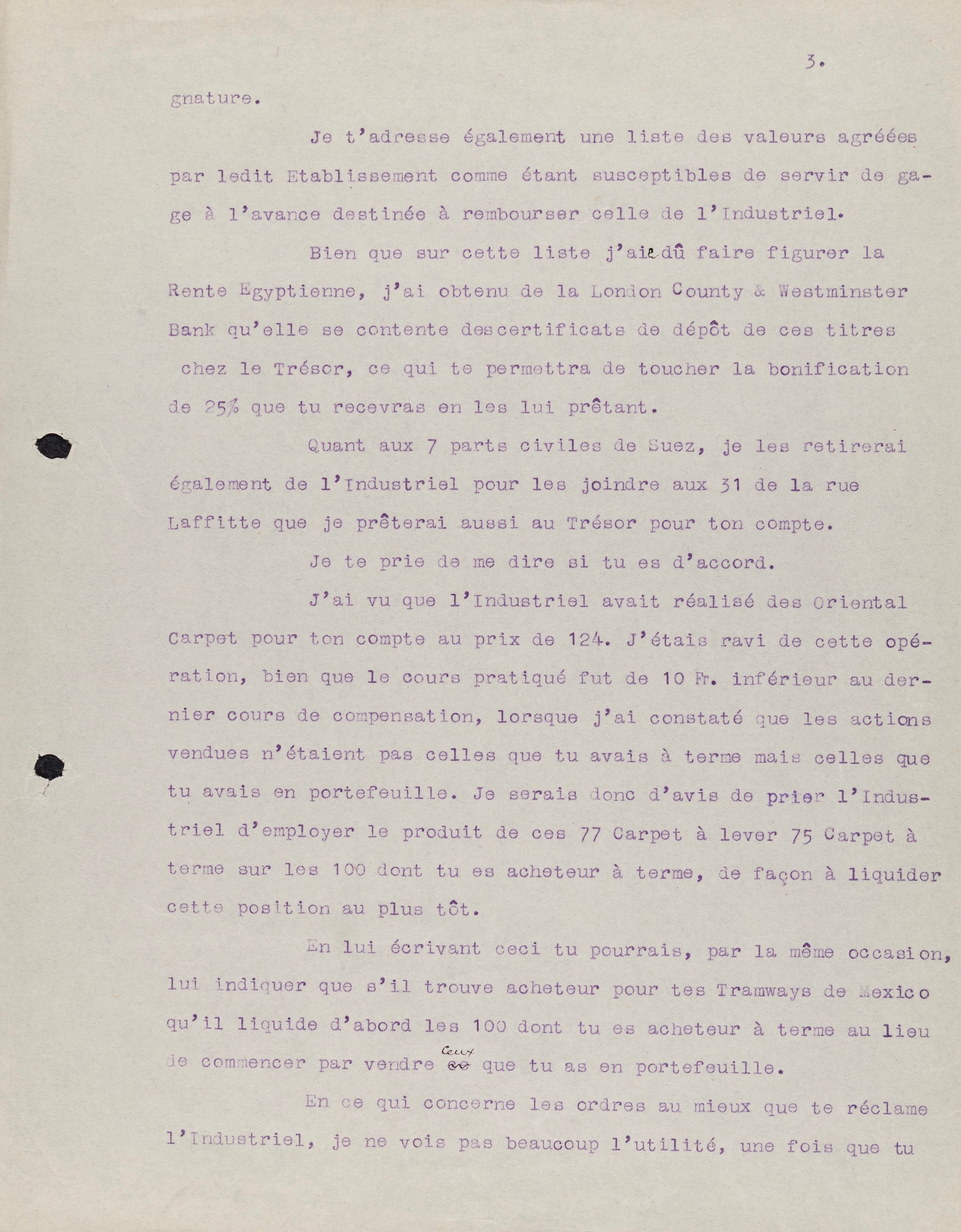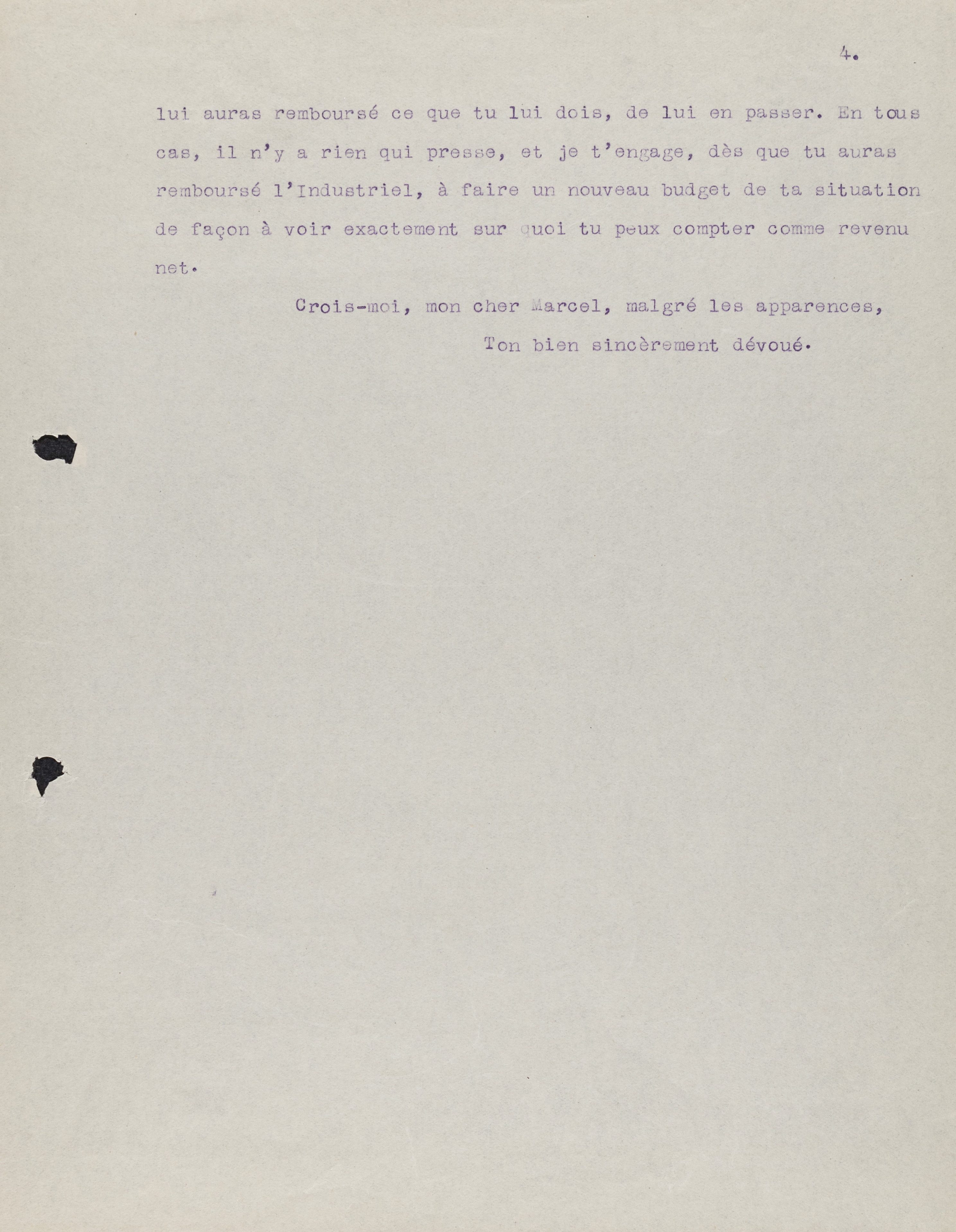By Nicolas Portugal, graduate student in French
Letter from Marcel Proust to Lionel Hauser, [27 May 1916] [1]
Saturday evening [2]
My dear Lionel
Your letter from yesterday amused me a lot, today’s one makes me sad because I do not find it right in any sense of the word. You compare me to a woman who wants to be beaten, but that would only be true if the considerations (which make me want to leave the operation to the limits we had first mentioned) were related to the Industriel [3]. I told you they did not have anything to do with it, and were family-related. But you know life too well not to know that everyone’s freedom is often hindered by considerations of this kind, different for everyone but analogous in principle. No doubt if everything was mathematical everything would be simpler. Surgically General Gallieni [4] should have been rid of his stone by lithotripcy [sic] [5], but already in the simple field of the body, there is the heart, the liver, the kidneys, etc. that do not leave any freedom to the surgeon etc. The Battle of the Marne [6] is a different example of those “imponderables” of which Bismark spoke, and since they do not make things easier for me, a word of kind comfort, as you often have had, would have done me more good than your sarcasm. Perhaps if there were no war there would be many moral situations I could modify through chats [7], to the extent that my health allows me to converse. But the war makes everything more difficult, which does not mean that I will never succeed. Dear Lionel I am very grateful to you when you are so good to me, but I cannot get used to your harshness sometimes. If you knew my friend d’Albufera (and it would only be of value if you knew him because you would have to see this harsh, belligerent and violent nature, to appreciate by contrast such sweetness toward me) I would make you read the letters that he and Bertrand de Fénelon wrote to me when I announced to them – as to everyone else [–] that I was ruined – [8]. I am not speaking of their enormous offer of money, which in less sincere beings might have seemed like a comedy, since they could well guess that I would not accept a penny, but words so tender, so comforting, so far from irony! Alas today the body of Bertrand de Fénelon rests God knows where, he was killed the first year of the war even though he was a diplomat not having to serve and was the most tolerant, the least “nationalist” being imaginable. If so many others that I loved like him, if not as much as him, are dead, d’Albufera is still alive. But this chatter drags on without being of interest for you, and overtires my eyes which can no longer write and cannot think of precious beings without crying. I am joining to this little note where I beg you to please not see – instead of the thank-you that is in my heart – an absurd reproach, two notices from the Crédit Industriel. (Here are 77 Carpet sold out of 100 futures.) [9]
Your sincerely grateful
Marcel Proust
[1] Letter catalogued as Proust-Series 3 /2A (Proust to Hauser) / Hauser 079, Rare Book and Manuscript Library, University of Illinois at Urbana-Champaign.
[2] The letter is dated only “Saturday evening”; based on the allusions to “your letter from yesterday” and “today’s one,” P. Kolb inferred the date as 27 May 1916.
[3] “Industriel” stands for Crédit Industriel et Commercial, a bank where Proust was a client.
[4] (Note by P. Kolb). General Joseph Gallieni was dying. Named Minister of War in the Briand cabinet on 30 October 1915, he had to resign on 16 May 1916 and was replaced by General Roques. On 19 May 1916, the newspaper Le Gaulois reported on Gallieni’s new surgery at Versailles by Dr. Marion, assisted by Dr. Friteau. The General’s death was announced on Le Gaulois’s front page the day after this letter, 28 May 1916.
[5] (Note by P. Kolb). Proust writes “lithotricie” instead of lithotritie. Lithotripsy is a surgical procedure that replaced lithotomy, consisting in crushing kidney stones to evacuate their fragments through the urethra.
[6] Proust is referring here to the first battle of the Marne, in September 1914.
[7] It seems that Proust means if there were no war, he would be free to go out to have conversations with friends.
[8] These letters from d’Albufera and Fénelon have not been found.
[9] After this sentence, three lines have been heavily crossed out, making them illegible.
Letter from Lionel Hauser to Marcel Proust, 29 May 1916 [10]
Paris, 29 May 1916.
My dear Marcel,
I just received your letter from Saturday night: its content did not surprise me.
I sincerely regret that the state of your health does not allow you to verbally explain the reasons that dictated your course of action, so I will abstain from any discussion on this subject, because there is no possible discussion on a subject-matter unless the topic under discussion is thoroughly known. Let us hope that, with good weather, you will soon have the opportunity to visit me and we could then take up again this topic which is far from being indifferent to me.
You reproach me, moreover, with being hard and ironic towards you, while you are otherwise surrounded by gentle and compassionate beings who treat you as you want to be treated. I accept your reproach very willingly, and I hasten to add that I will do nothing to change the way I treat you.
Unfortunately, you live in an atmosphere of idealism from which you certainly draw infinite enjoyments that you could hardly find on earth.
I understand this all the more because I spend part of my life in the world of the unreal, but unfortunately you are making the serious mistake of confusing that world and the beings who live in it, with the physical realm and its inhabitants. That is the root of all your misfortunes.
You have grown since your childhood, but you have not grown up, you have remained the child who does not understand being reprimanded even when he has been disobedient. This is why you have more or less eliminated from your circle all those who, not allowing themselves to be cuddled by you, had the courage to reprimand you when you had not been well-behaved. The consequence is the situation in which you find yourself.
You lament to your friends that you are ruined – which you exaggerate, by the way – and, without realizing that you are the sole author of your ruin, you expect them to pity you, and you oppose the touching response of a member of your circle to the brutal way that I dare to shake you, while I do my best to cork the holes that you made in your boat.
I absolutely share your opinion that man is not entirely the master of his destiny, but this observation should not encourage you to let go of the rudder while your mind, lulled by charming dreams, hovers over your languid body. And that makes me jump. I accept letting you dive body and soul in the absolute, but only after you have repaid all your advances. In the meantime, I will do all I can to wake you up, which explains why instead of opium I use dynamite.
To now return to Earth, I give you two cards from your new banker: London County and Westminster Bank, Paris, Ltd. Please return them with your signature.
I am also sending you a list of securities approved by this Institution as being able to serve as a pledge in advance to repay that of the Industriel.
Although on this list I had to include the Egyptian Annuity, I obtained from the London County and Westminster Bank that it is satisfied with certificates of deposit of these securities at the Treasury, which will allow you to receive the 25% bonus that you will receive by lending them.
As for the 7 civil shares of Suez, I will also remove them from the Industriel to join them at 31 rue Laffite, which I will also lend to the Treasury on your behalf.
Please tell me if you agree.
I saw that the Industriel had sold Oriental Carpets for your account at a price of 124. I was delighted with this operation, although the price was 10 francs lower than the last clearing price, when I found that the shares sold were not the ones you had as futures but the ones you had in your portfolio. I would therefore urge the Industriel to use the proceeds of these 77 Carpet to raise 75 Carpet futures from the 100 of which you are a futures buyer, so as to liquidate this position at the earliest.
By writing them you could, at the same time, tell them that if they find a buyer for your Mexico City Trams that they first liquidate the 100 for which you are a futures buyer instead of starting with selling the ones you have in your portfolio.
As for the market-orders the Industriel demands, I do not see much usefulness, once you have repaid what you owe them, to provide those. In any case, there is no rush, and I urge you, as soon as you have paid the Industriel, to make a new budget of your situation so as to see exactly what you can count as net income.
Believe me, my dear Marcel, in spite of appearances,
Your sincerely devoted
[Lionel Hauser] [11]
[10] Letter catalogued as Proust-Series 3 / 2 (Hauser to Proust) / LH 066, Rare Book and Manuscript Library, University of Illinois at Urbana-Champaign.
[11] Because this is a carbon copy (made for Hauser’s business archives) of the typed letter sent to Proust, it is not signed.
This exchange between Proust and Lionel Hauser (1868-1958) from May 1916, written in a humorous, sometimes ironic style, also reflects the seriousness of Proust’s financial situation and the consequences of the Great War on some of its key players.
Taking the French General Joseph Gallieni as an example (“Surgically General Gallieni should have been rid of his stone by lithotripcy” [sic]), Proust demonstrates his knowledge of current events related to the war. General Gallieni was a leading figure of the French military forces, famous for his actions in the French colonies; his surgery and health were reported in the French newspaper Le Gaulois on 19 May 1916. The General’s death was announced on Le Gaulois’s front page on 28 May 1916, one day after Proust wrote this letter to Hauser.
Proust uses Gallieni’s poor health as a comparison to his own, to explain the financial problems he is facing: through this analogy, the war becomes linked to his own struggles. “Perhaps if there was no war there would be many moral situations I could modify through chats […] But the war makes everything more difficult, which does not mean that I will never succeed.”
Proust specifically refers to the first battle of the Marne in September 1914, which resulted in a victory from France and its allies over Germany and prevented the Germans from marching on Paris. In Le Côté de Guermantes, Proust uses the word “impondérables” through his character Mr. de Norpois, who says he knows Bismarck, and uses the word to describe the chancellor in a conversation with Mme de Villeparisis [12]. Proust had possibly noticed the term in Le Figaro from 4 August 1914, at the start of the war, when it was reported that Bismarck used it in a speech to the Prussian Landtag in February 1868; the quote was repeated again in other articles in 1915 and 1916 [13].
If Proust sees himself as “trapped” by his problems, as Paris was by the German invasion, Hauser sweeps away his self-pity with brutal honesty: “I absolutely share your opinion that man is not entirely the master of his destiny, but this observation should not encourage you to let go of the rudder while your mind, lulled by charming dreams, hovers over your languid body.”
Moreover, Proust mentions his correspondence with two close friends, the marquis Louis d’Albufera and Bertrand de Fénelon: their letters to Proust have not reached us. Both were officers during the war, and Fénelon’s death on the field of the battle in December 1914 had a great emotional impact on the writer: “[I] cannot think of precious beings without crying” [14].
This close correspondence between Hauser and Proust, who were distantly related through marriage, reveals Proust’s vulnerability as well as his sharp and well-documented knowledge of the current events of the war. As a financial advisor, a friend and a confidant, Hauser addresses Proust’s turmoil as well as money issues with refreshing honesty.
[12] This is signaled in a note by P. Kolb in Corr., vol. XV, p. 128-129. See À la recherche du temps perdu, vol. II, p. 522.
[13] As suggested in a note by P. Kolb in Corr., vol. XV, p. 129.
[14] See for instance this letter from March 1915 about Fénelon’s death.
Works cited
Proust, Marcel. À la recherche du temps perdu. Ed. dir. Jean-Yves Tadié. Paris: Gallimard (4 vols), 1987-1989.
Proust, Marcel. Correspondance. Ed. Philip Kolb. Paris: Plon (21 vols), 1970-1993.
